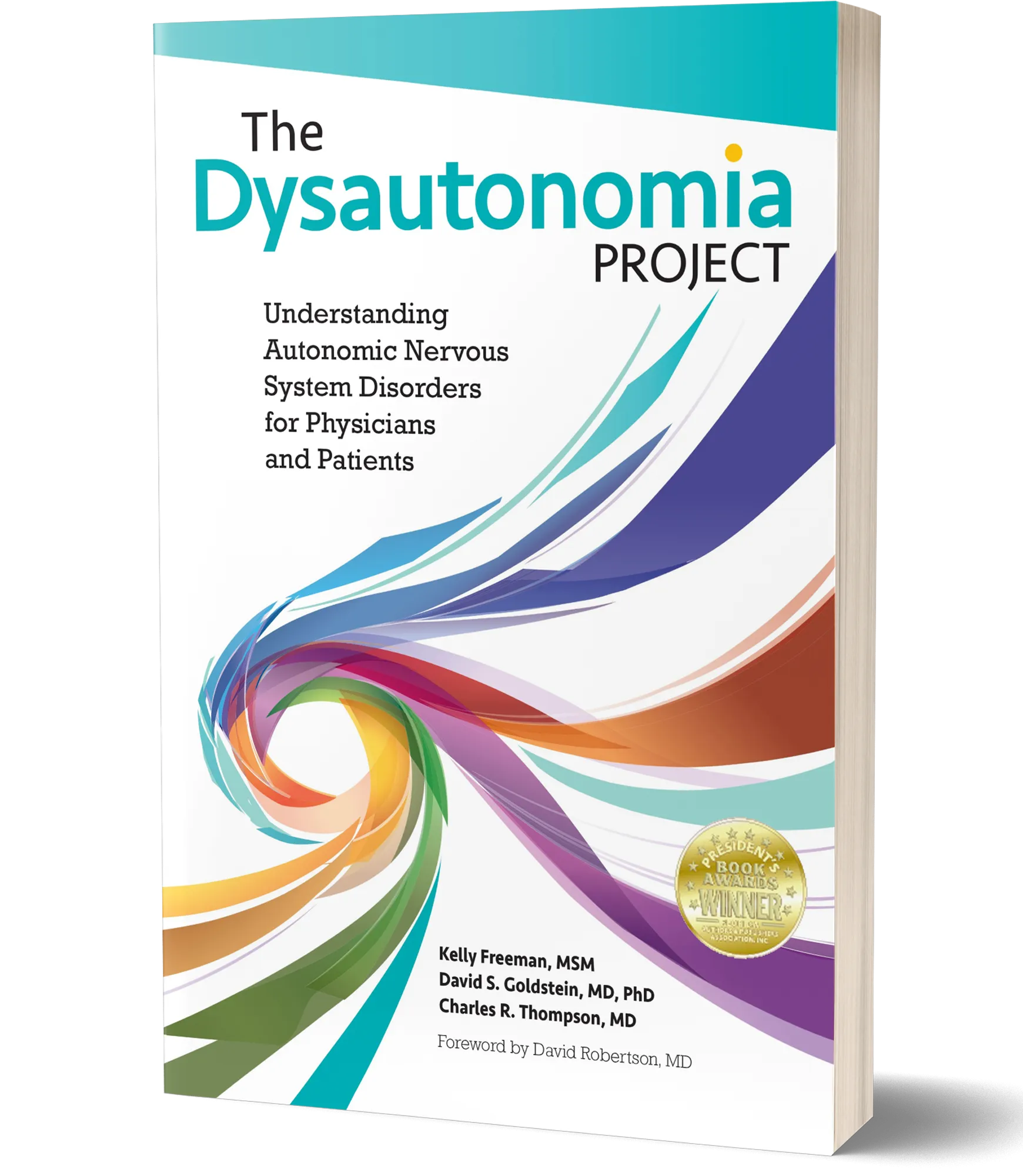Experienced dysautonomia patients know that trying new treatments takes time. You may have success with a treatment for one set of symptoms while managing other symptoms that may change from one doctor’s appointment to the next. We know this isn’t easy. If you’ve felt discouraged, you aren’t the first. But there is hope.
There are patients who’ve gone before you. They are managing their symptoms, getting better, and giving hope to others. If you’re not there yet, don’t give up. There’s ongoing research conducted by autonomic specialists to better understand dysautonomia treatments. There are things you can do to make the most of your treatment plan and the life you’re now living even if that life looks different than the one you expected. And there are ways to get involved and help others who are just starting out on this journey.
Don't lose hope. Don't do DYS alone.
No one asks for a chronic illness, especially one that is hidden and unknown by most of the world. Because dysautonomia is an invisible illness, it’s easy for others to forget that you must manage your symptoms daily. Well-meaning friends and co-workers may tell you how good you look and assume your autonomic disorder is no longer a problem for you. Meanwhile, you may feel like you’re suffering in silence and alone. If it’s been a while since you were first diagnosed and you haven’t found a treatment plan that manages your most difficult symptoms, you may get discouraged, and feel like giving up. You wouldn’t be the first to feel this way.
- If you are feeling hopeless or struggling with depression or thoughts of suicide, talk with your doctor, with a loved one who will take your concerns seriously or call for help. Depression is nothing to be ashamed of and is more common in individuals struggling with chronic illness. There are people who can help. Reach out to your health care provider if you are struggling with depression. In case of emergency (thinking about suicide) contact the National Suicide Prevention Lifeline: 1-800-273-8255
- If you have POTS, it’s important to understand the relationship between POTS and Depression.
- If your family member or friend is struggling with depression or you notice changes in behavior and signs of suicide ideation, it’s important to talk about it, and take steps to help and intervene on their behalf if necessary. You can’t worry about offending them or overstepping boundaries. What To Say and Do When Your Loved One is Depressed.
Chronic illness can feel isolating and overwhelming. Despite these challenges, we want you to know there is reason to hope and that things can get better. There is strength in numbers and knowing you’re not alone.
[Disclaimer regarding medical advice found in support groups. TDP recognizes the value of dysautonomia support groups for patients dealing with this chronic illness. Before following medical advice or treatment options presented in these groups, patients should discuss them with their provider.]

Be scientific about managing your care.
It’s important to build a relationship with your doctor that is more mature. Taking ownership of your healthcare means not just looking for answers when you see your provider, but also bringing scientific data about your symptoms and responses to treatments. It’s working with your provider to find options. This is known as flipping the clinic. Assuming your provider understands dysautonomia, then it’s time to partner with them in creating a symptom management plan.
If you haven’t already started to track your current and new symptoms and responses to treatment as well as keeping a notebook of your medical records, this is a good time to start.
Keeping Track of Your Medical Records
Take advantage of our Autonomic Disorders Assessment. This assessment was designed with the patient in mind. This is a free educational assessment which can be used by individuals who suspect they may have an autonomic disorder or those who have already been diagnosed with an autonomic disorder. We encourage individuals to repeat this assessment in the future to identify trends in health by saving a copy of this assessment report. We also encourage you to review the results with your health care provider.
Be prepared for new and changing symptoms.
Disorders of the autonomic nervous system (ANS) are especially challenging because our bodies are continuously changing and adapting. This includes your ANS. As your ANS adapts and grows, you can anticipate changes in your symptoms and how your body responds to treatments. For example, your main symptom might be migraines right now but gastrointestinal symptoms next year. Experienced dysautonomia patients need to be ready to deal with these changes. Tracking changes—when they start, what exacerbates the new symptom, and the severity—will help you and your provider when considering treatment options.
Be willing to try new things.
You probably know by now that dysautonomia treatments are not a one size fits all; what works for one patient may not work for you. When you continue to have problems, it is helpful to make changes one treatment at a time and be willing to consider new treatments. For instance, if your provider suggests trying two new medications it is helpful to begin only one and test for a couple of weeks before trying the other. And, in some cases there are multiple formulations of treatments to explore with your provider. The more you continue to educate yourself on new or similar treatment options the more likely you will be to find the ideal combination of treatments.
Go live your life as best you can.
Track symptoms. Learn about dysautonomia. Keep up with new research. Schedule doctor appointments. Try new treatments. All of this is important as you navigate life with an autonomic disorder. However, if you’re not careful, dysautonomia can consume your life. Don’t let it.
Learning to live with autonomic dysfunction means creating a new normal for yourself. There’s no doubt that this will look different than the life you once lived or planned. Part of moving forward and creating a new normal means grieving what you’ve lost or what’s changed since the onset of your symptoms. This is part of dealing with a chronic illness. Give yourself permission to grieve. If you feel stuck in your grief, talk with a mental health counselor, clergy member, or someone you trust during this time. And don’t be afraid to mention signs of depression to your provider.
If your symptoms are disabling, try to find simple ways to enjoy life. It could mean having a friend take you in your wheelchair to get ice cream or coffee or sitting outside on a day when the temperature is right, and your body allows you to do so. It may mean going to a social gathering to see friends knowing you can only stay for a short time even though you used to be the life of the party. Whatever it is that you can do, do it. Live the life you have right now as best as you can.
Give back to others on this journey.
As someone who has lived with dysautonomia for a while, you have something valuable to offer to others on this journey: Experience. Some of TDP’s best partners are patients. We welcome patient volunteers and the perspective they bring to our mission. Consider connecting with TDP. Studies show that giving back to others is good for our mental and physical health. If you need to focus on something other than dysautonomia, then find another way to encourage, serve, and support others. Use your talents and gifts to help others because no matter where you are on this journey, giving back can be mutually beneficial.
































4 Responses
Never Give up Hope, I have been there before where I did give up hope. I Have a form of Dysautonomia. You can always find a doctor out there that will not give up on you! I travel to find the care ,I need and it’s not cheap or easy ,but I do it to keep my fight . I have set backs and I have to keep the fight . Hope is the key answer. I raise awareness for Dysautonomia to educate others about Dysautonomia and to help patients just like me know that if I can have my accomplishments then so can you. Yes it will take time. Yes you might find doctors who treat you not so right , push past that there is a doctor out there for you just I have for me. I’m in a fight right now but I’m still going strong even though I might have to travel ,even though I might not get to compete next year but next year hasn’t happened yet so right now until it happens I’m still going to try to achieve my goals. I’m a warrior.
As A Patient with Dysautonomia , I’m grateful for finding the Dysautonomia Project. Every year I raise awareness for Dysautonomia to educate others that you are not alone in this battle . I know what it’s like to give up hope. I have been there , but with the right doctor that will listen to your concerns . You can get diagnosed and start your journey ,just like I have to do to find the right team of network to get the help I need. Educate medical professionals about Dysautonomia, I give out the Dysautonomia bracelets and point them to the websites out there or donate my book for them to read or willing to learn so they can help out the next patient they see.
Thank you Ann! We are so grateful to know you and be a part of your journey.
I was diagnosed with POTS at age 15 after having tests at 14. I was a high level basketballer and had to stop for a short time as they didn’t know what was wrong. I went unmedicated until I was 23. I had symptoms a lot but did what I could to continue them. I now have EDS, MCAS and many other conditions as well. I am on beta blockers but still my heart rate is too fast a majority of the time. I refuse to give up my job I am a fulltime manager of an auto parts store and I study part time as well. I spread awareness as often as I can because no one notices my daily struggles I look normal until it’s really bad and I’m off to hospital. I share doctor information on my TikTok as finding someone in Australia that knows about EDS and can treat me with that in mind is very very had it has taken me until I was 26 to find a decent team of drs. There is hope, new treatments and hopefully people become more aware!